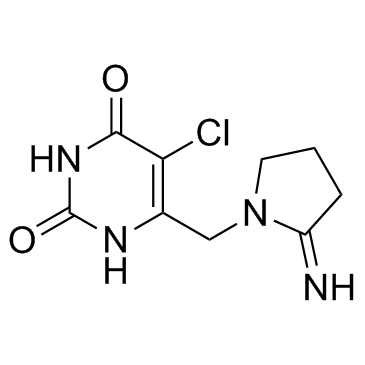183204-74-2
| Name | 5-chloro-6-[(2-iminopyrrolidin-1-yl)methyl]-1H-pyrimidine-2,4-dione |
|---|---|
| Synonyms |
Tipiracil
5-CHLORO-6-(1-(2-IMINOPYRROLIDINYL) METHYL) URACIL UNII-NGO10K751P MA-1 2,4(1H,3H)-Pyrimidinedione, 5-chloro-6-[(2-imino-1-pyrrolidinyl)methyl]- TPI 5-CIMU C9H11ClN4O2 5-chloro-6-[(2-iminopyrrolidin-1-yl)methyl]pyrimidine-2,4(1H,3H)-dione 5-Chloro-6-[(2-imino-1-pyrrolidinyl)methyl]-2,4(1H,3H)-pyrimidinedione |
| Description | Tipiracil is a thymidine phosphorylase (TPase) inhibitor. |
|---|---|
| Related Catalog | |
| Target |
thymidine phosphorylase[1] |
| In Vitro | Tipiracil is an inhibitor of thymidine phosphorylase. Tipiracil increases trifluridine exposure by inhibiting its metabolism by thymidine phosphorylase. The combination of Trifluridine and Tipiracil is a new oral treatment for metastatic colorectal cancer[2]. Tipiracil prevents degradation of FTD through a first-pass effect as a thymidine phosphorylase inhibitor[3]. |
| Cell Assay | HeLa cells are seeded in 96-well plates at 500 cells/180 μL/well in triplicate, pre-cultured for 24 h, and then 20 μL of each drug solution is added for 24 or 72 h. For the 24 h treatment, cells are washed with phosphate-buffered saline (PBS) after treatment, drug-free medium is added to each well, and the culture is further incubated for 48 h. Cell growth inhibition is evaluated using a Cell Counting Kit-8. The 50% inhibitory concentration (IC50) values are calculated from the absorbance data using SAS[3]. |
| Animal Admin | Mice[3] For experiments, 8 mm3 cubic fragments of tumor are implanted subcutaneously into the axilla of mice. For preparation of the orally administered FTD solution, FTD is dissolved in a 0.5% aqueous solution of hydroxypropyl methyl-cellulose (HPMC). The FTD solution for continuous infusion is prepared by dissolving FTD in physiological saline. The TAS-102 dosing solution is composed of FTD and TPI dissolved in a 0.5% aqueous solution of HPMC at a molar ratio of 1:0.5. The dose of TAS-102 is expressed on the basis of the amount of FTD. For preparation of the S-1 solution, FT, CDHP and Oxo are dissolved in a 0.5% aqueous solution of HPMC at a molar ratio of 1:0.4:1. The dose of S-1 is expressed on the basis of the amount of FT. When the tumor volume reaches 100 mm3, the mice are randomly assigned into different treatment groups. Nude mice in the treatment group receive the test compounds. The control group receive no treatment. For continuous infusion, the compound is administered with an osmotic pump. Tumor volume is measured twice a week throughout the experiments. Tumor volume and relative tumor volume are calculated. Body weight changes (BWCs) are used as a proxy measure of side-effects, and calculated. The tumor growth inhibition rate (IR) % on day 15 is used to quantify the antitumor effect. |
| References |
| Density | 1.7±0.1 g/cm3 |
|---|---|
| Molecular Formula | C9H11ClN4O2 |
| Molecular Weight | 242.662 |
| Exact Mass | 242.057053 |
| PSA | 93.33000 |
| LogP | -1.37 |
| Index of Refraction | 1.743 |
| Storage condition | 2-8℃ |
